Oppenheimer repair clinics ($48,643)
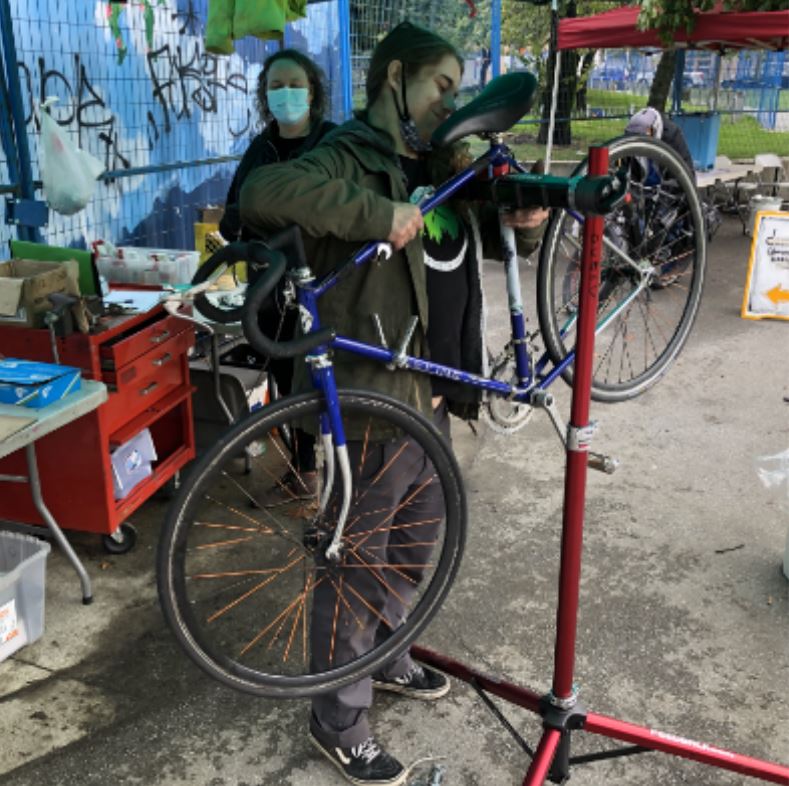
P.E.D.A.L./ Our Community Bikes External website, opens in new tab
The Oppenheimer Repair Clinics promote active transportation in the Downtown Eastside (DTES) by offering free repair clinics twice a week for 3 hours. DTES residents gain, or maintain, transportation access and the lifespan of their mobility device is extended. Waste is reduced, education takes place, and climate impacts are minimized.
Supports: Climate Emergency Action Plan
Cultivating green-blue spaces in the Still Creek watershed ($38,915)

Still Moon Arts Society External website, opens in new tab
This project supports community-engaged green infrastructure creation in three parks within the Still Creek Watershed, combined with Still Creek restoration and enhancement. Public education and engagement with stewardship, urban nature and climate adaptation, prioritising equity-deserving groups, with the aim of increasing resilience, mitigating flooding, and increasing biodiversity as well as equitable access to natural spaces.
Supports: Climate Change Adaptation Strategy
Vancouver Youth Climate Corps ($48,643)
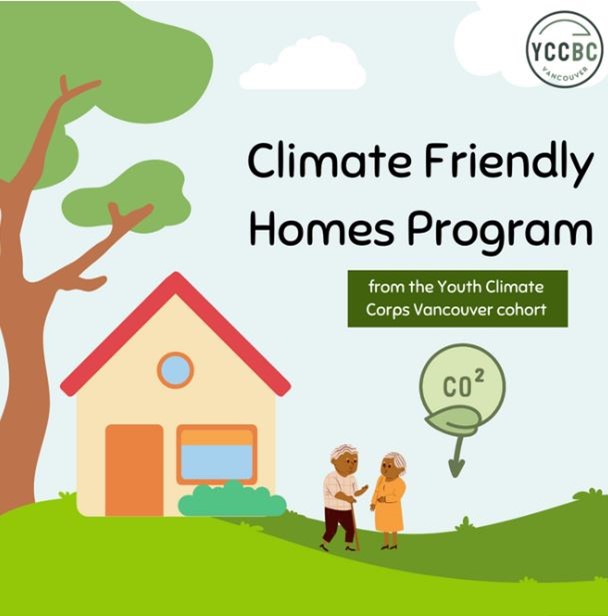
Youth Climate Corps BC (YCCBC) External website, opens in new tab
The Youth Climate Corps BC (YCCBC) is an employment service program that provides young people aged 17 to 30 with jobs and training in community climate action projects, while paying them a living wage. YCCBC will work to foster young climate leadership, civic engagement and workforce readiness in climate jobs for young Vancouverites.
Supports: Climate Emergency Action Plan, Climate Change Adaptation Strategy
Cool It! Climate Leadership Training in the City of Vancouver ($35,576)
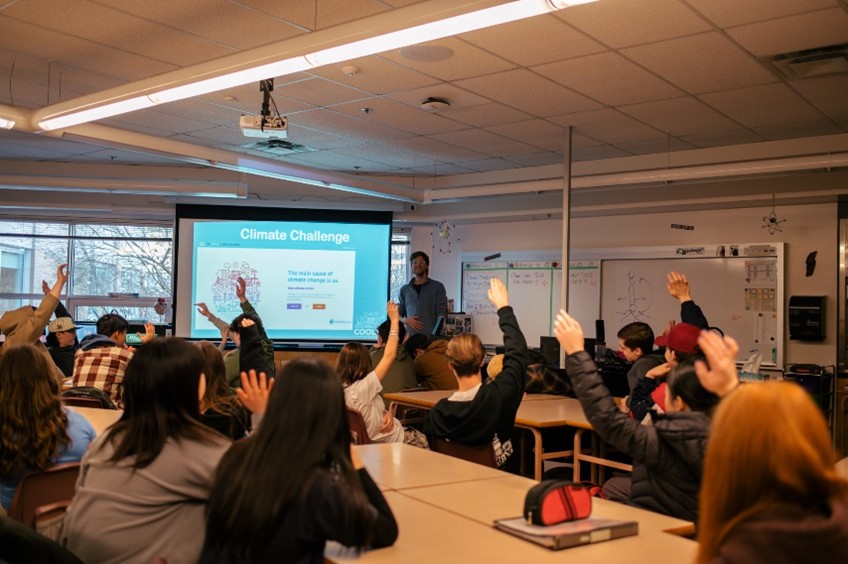
BC Sustainable Energy Association External website, opens in new tab
The Cool It! program is an environmental education initiative delivered in schools across BC. It combines interactive workshops with a take-home climate-action curriculum, improving students' understanding of climate science and providing tangible actions they can undertake.
Cool It! workshops provide a foundational level of climate science literacy — focusing on the causes, impacts, and solutions to climate change — with an emphasis on local impacts as well as mitigation and adaptation strategies, examples of youth climate action, green careers, climate justice, as well as Indigenous knowledge and concepts related to climate change mitigation and environmental stewardship.
The goal is to educate 1,380 grade 4 to 12 students in underserved schools and communities in Vancouver.
Supports: Climate Emergency Action Plan, Climate Change Adaptation Strategy
Bike Parking Retrofit Program for Older Buildings ($44,470)
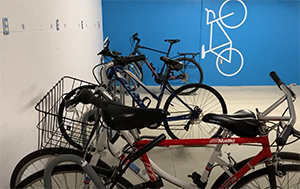
Hub Cycling External website, opens in new tab
This program guides 5 older mid-sized Vancouver residential buildings through the process of upgrading bike parking facilities, focusing on buildings housing socio-economically disadvantaged residents.
HUB will support landlords, building managers, and stratas to identify options and costs for new bike parking rooms and equipment, provide them with guidance on municipal permitting processes, and assist with financial subsidies to contract bike rack and related installations from suppliers and contractors.
In doing so, this project will enable the expansion and improvement of parking facilities for regular bikes, e-bikes, and family and cargo bikes in 5 older residential buildings to increase accessibility, security against bike theft, and personal safety for people using cycling facilities for an estimated 500 people.
Supports: Climate Emergency Action Plan
Eco-Voyage 2.0: Sustainable Journeys for All ($40,024)
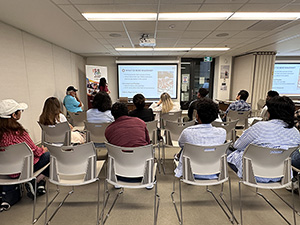
Better Environmentally Sound Transportation External website, opens in new tab
Eco-Voyage aims to build sustainable transportation skills among newcomers and equity-seeking groups, encouraging active transportation lifestyles and reducing social isolation. The project offers workshops and digital content on multimodal transportation, encouraging participants to navigate Vancouver confidently and sustainably.
Building on their 2024 pilot’s lessons and successes, in 2025, Eco-Voyage will bridge information gaps on sustainable transportation modes and how to use them, build participants’ skills and confidence around using these modes, and encourage them to envision how sustainable transportation can help address inequities in their communities.
Supports: Climate Emergency Action Plan
Intergenerational Climate Response Group ($35,576)
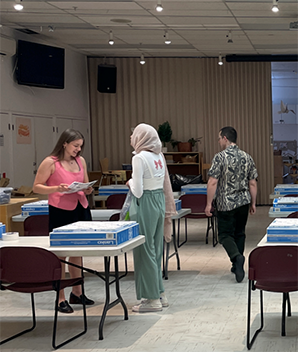
Frog Hollow Neighbourhood House External website, opens in new tab
The Intergeneration Climate Response Group empowers youth and seniors to enhance climate resilience by collaborating in intergenerational communities. They will work together to create and distribute cooling kits for disabled seniors and co-facilitate workshops on building affordable air filters, focusing on accessibility, cultural relevance, and climate action.
The project aims to support vulnerable populations—especially disabled seniors—during extreme heat events. It expands on the Youth Skills program by emphasizing accessibility, cultural relevance, and intersectional climate action, ultimately empowering both youth and seniors to be active agents in their community’s resilience efforts.
Supports: Climate Change Adaptation Strategy
Seniors’ Summer Club ($44,470)
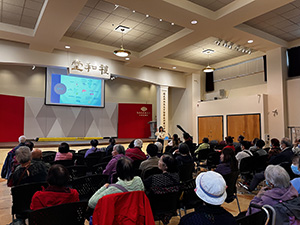
S.U.C.C.E.S.S. External website, opens in new tab
The Seniors' Summer Club aims to increase awareness of climate change impacts among equity-deserving groups, including seniors, low-income individuals, persons with disabilities, and racialized people in Chinatown.
The project includes workshops, translated materials, cooling centers, and community outreach to enhance social connectedness and resilience to climate change.
Supports: Climate Change Adaptation Strategy
Waste Not, Want Not ($44,470)
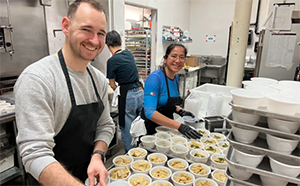
A Better Life Foundation External website, opens in new tab
This project aims to improve access to healthy food among equity-deserving communities, while also reducing unnecessary food waste, GHG emissions, and natural resource use.
The project will divert edible food from waste streams to the preparation of healthy meals and food hampers for the local Downtown Eastside (DTES) community, with a focus on expanding the Women-Led Families Meal Program. The meals are packaged in compostable containers and delivered by zero-emission electric tricycles.
Supports: Vancouver Food Strategy
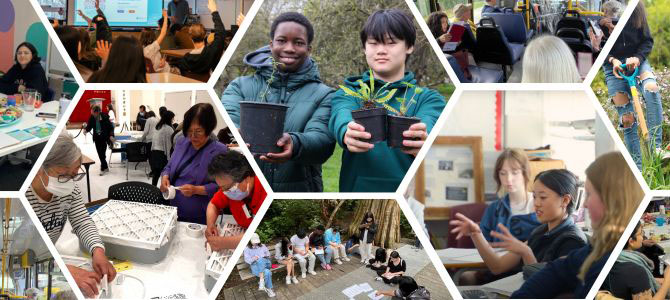

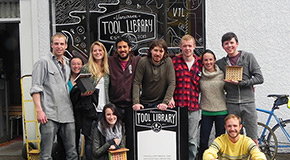 Celebrating the successes of the Greenest City Grant
Celebrating the successes of the Greenest City Grant








